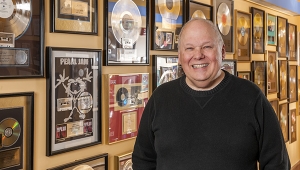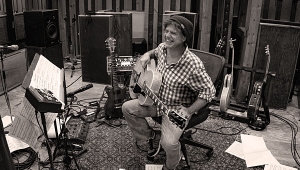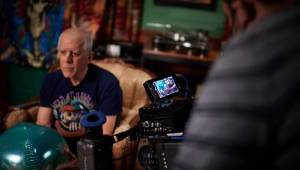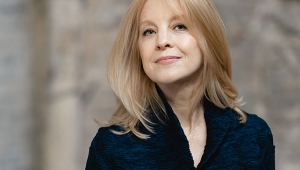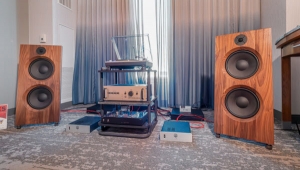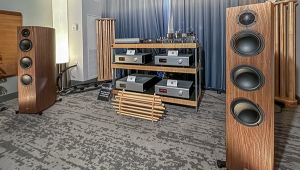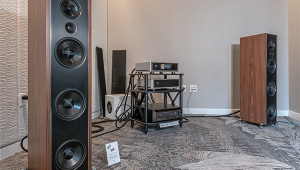| Columns Retired Columns & Blogs |
Samara Joy

Photo by Meredith Truax
23 year-old Samara Joy is the recipient of the 2023 Grammy Awards for best new artist and best jazz vocal album. Her 2022 sophomore outing, Linger Awhile (Verve), is a jubilant celebration of The American Songbook. Her warm, velvet-dark vocal tone, graceful swing sense, and intuitive interpretations provide a master class in classic jazz fundamentals.
Joy owns the past but also the present. On her TikTok channel, "Samarajoysings," she has accumulated 585,100 Followers and 4.3 million Likes. The channel documents performances of such standards as "A Foggy Day," "Guess Who I Saw Today," an a capella "Somewhere Over the Rainbow," and a sublime "Round Midnight," delivered in multi-octave glory. Old and new, together. Read that last bit again, about TikTok. That Joy is popular with jazz fans will surprise no one who has heard her music. That she has won such a following on a platform dominated by 10–19-year-olds—mainly by singing 70-year-old songs—boggles the mind.
Even as many jazz writers, labels, and magazines seem to have thrown in the towel on attracting the jazz-unwashed masses to jazz, Joy has captured the hearts and minds of their children with a style inspired by Sarah Vaughan, Betty Carter, Carmen McRae, and, to a lesser degree, Billie Holiday. We wonder what it takes to reach younger audiences; maybe what it takes is the right artist.
One listen to Linger Awhile makes it clear that Joy is a generational talent, most closely resembling a young Ella Fitzgerald. Music courses through her 5' 4" frame like a force of nature; she contains and guides it, yielding bliss, exhilaration, and—yes—joy.
Joy was informed and nurtured by her gospel-singing family. Her grandparents, Ruth and Elder Goldwire McLendon, founded the popular gospel group, The Savettes, which recorded four albums during the 1960s and 1970s. You can hear the essence of their passionate, Jesus-serving, gospel-soul sounds in Joy's deep contralto, both in jazz and in the impassioned gospel/blues wails she displays in a few TikTok videos.
There's a YouTube clip of The Savettes singing "What If He Came Back Today," driven by Hammond organ and upright piano. The 38-member choir belts a powerful gospel message free of the gaudy drums/synths/electric bass accompaniment found in too many contemporary church bands.
So much great jazz has come out of the church—especially vocals. Samara Joy extends that tradition of bringing elements of sacred singing to spirit-hungry secular audiences. Joy's music, then, can be thought of as a point in the development of a musical strain that reaches back to "Freedom Churches"—Black A.M.E. Zion Churches during the post-emancipation period. Spiritual fervor, power, and passion run both deep and close to the surface—the same fervor, power, and passion that forms an unbroken line among great Black American singers: Little Richard, Aretha Franklin, Mahalia Jackson, the Dixie Hummingbirds, Kirk Franklin, Andraé Couch, BeBe and CeCe Winans.
Joy is very definitely a jazz singer, but the emotional core of her music seems shaped by the church.
The musicians on Linger Awhile include guitarist Pasquale Grasso, pianist Ben Paterson, upright bassist David Wong, and drummer extraordinaire Kenny Washington. "Can't Get Out of This Mood," a charming midtempo romp, finds Joy slowly and gracefully turning up the heat, at one point recalling Ella Fitzgerald's Ella Swings Lightly, her collaboration with the Marty Paich Dek-Tette. Joy's version of the Nancy Wilson star turn "Guess Who I Saw Today" cuts clear as a bell; Joy makes the familiar romantic fable feel fresh. Gigi Gryce's "Social Call" benefits from Joy's skill at storytelling and her cool demeanor—until the second verse, when she invokes the bolder spirit of Betty Carter with her explosive dynamic range and malleable phrasing, adding her own youthful exuberance.
Perhaps the true test of any great jazz vocalist is how they sing a ballad, and Joy renders "Misty" and "Someone to Watch Over Me" with a skill and informed grace that belie her age.
Linger Awhile hits with all the force of a comet and the beauty of a summer rainbow.
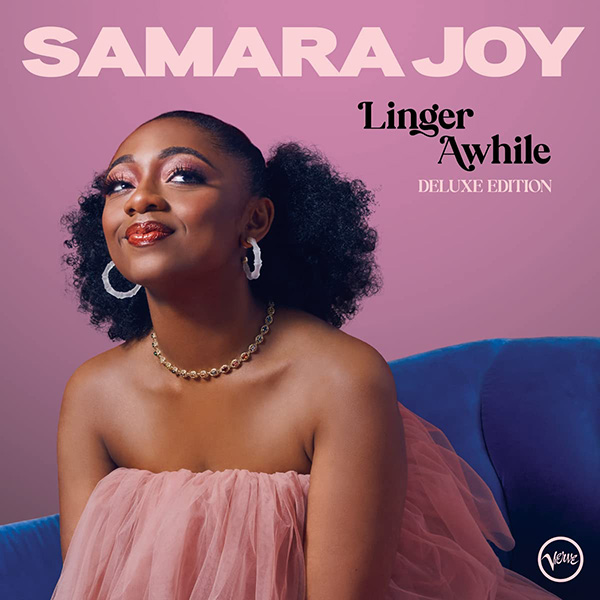
Ken Micallef: I love your second album, Linger Awhile. You're such a breath of fresh air for people like me who love jazz and wonder where it's heading. How does this record differ from your previous one, the self-titled 2021 Whirlwind recording?
Samara Joy: I recorded the first record while I was still an undergraduate, in October of 2020. The second album, we recorded in March of 2022. By then I had had a year or so worth of gigging and touring and traveling and singing and getting more comfortable with my voice. A lot more growth, more additions to my repertoire, and trying to find songs that I could make my own. The second record showcases a small step in musical development, I think on all sides, whether it be my voice or repertoire and interpretation.
Micallef: You have your own songs?
Joy: I have a couple, but not that I've recorded yet. I feel different about recording my own songs when I sing a lot of beautiful songs and melodies. I want to make sure mine live up to the kind of standard that I have set for myself as far as choosing good repertoire. For Linger Awhile, I added lyrics to two songs, which were already written: "Nostalgia" and "I'm Confessin' (that I Love You)." (footnote 1) For the arrangements, I collaborated with Pasquale or Ben. The only thing that I didn't arrange was the horn chart on "Round Midnight."
Micallef: Why did you choose Matt Pierson to work with as producer after working with him on your first record?
Joy: I wanted to keep a consistent sound. A lot of people were introduced to me by my first record, to the sound that we created then. So I figured we would continue in the same vein for the second record and keep the same sound.
Micallef: I love your arrangement of "Lush Life," especially the Afro-Cuban section.
Joy: That's inspired by Dizzy Gillespie's version of "Round About Midnight," with Slide Hampton.
Micallef: Why cover these particular songs? "Someone to Watch Over Me," "Misty." I never wanted to hear "Misty" again in my life. But you've made them fresh. Why such old and familiar standards?
Joy: At the time, that was what I was listening to. I was listening through artists, both instrumentalists and musicians and singers. I was getting into Carmen McRae's repertoire and what she'd recorded, as well as Sarah Vaughan. Because their repertoire is mainly standards—well, Carmen McCrae has a couple of original songs, but mainly I was listening to their interpretations of standards. And so that was what I wanted to present because that was what I was listening to. I was listening to them interpret those old songs, which weren't as old at the time they recorded them, but making them new. I wanted to record that music and make it new with my voice and my interpretation. Now I'm listening to more singers, like Betty Carter and like Abbey Lincoln; they wrote their own music and had their own sound. That's also affected my musicianship and compositions. Each of my albums depict what I was listening to at the time and what I was inspired by and what I wanted to present, based on my inspiration.
Micallef: Abbey Lincoln can be unpredictable. What's that album of hers? I forgot the name of it, but melodically it can go against the grain. It shocked me.
Joy: Oh, yeah. That's Straight Ahead.
Micallef: Carmen McRae made so many great records, in a broad array of jazz approaches. I definitely hear Sarah Vaughan and Betty Carter in your style, especially when you become more extroverted, I hear that surge of Betty Carter–type energy.
Joy: She's so unique.
Footnote 1: "Nostalgia" was written by Fats Navarro. "I'm Confessin' (that I Love You)" is a standard with unclear attribution. On its first recording, from 1930, the music is credited to Doc Daugherty and Ellis Reynolds, although the tune existed previously. The original lyrics are by Al Neiburg.
- Log in or register to post comments


